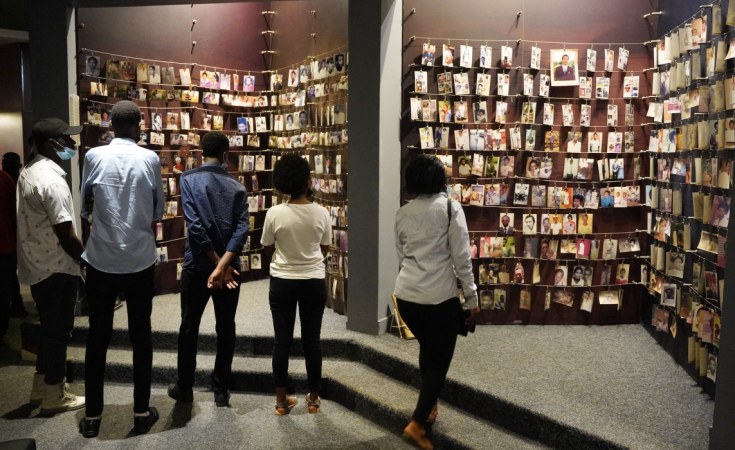Following her exploration of the Gishwati-Mukura National Park and Biosphere Reserve, as well as the Volcanoes National Park on August 31, UNESCO's Director General, Audrey Azoulay, who is in Rwanda on a three-day visit, was one of the namers of the 23 baby gorillas during Kwita Izina.
The New Times' Germain Nsanzimana talked to her about her visit, naming a baby gorilla, and the progress of making Rwanda's Genocide memorials Kigali World Heritage sites.
Excerpts:
Could you provide insights into your recent visit to Gishwati-Mukura National Park? What were the key objectives and outcomes of the visit?
Azoulay: I am delighted to be in Rwanda for this visit focusing on an important pillar of UNESCO's mandate: protecting biodiversity, by finding a balance between humans and the environment.
Rwanda is home to two UNESCO biosphere reserves, which are exemplary in this field.
The Volcanoes UNESCO Biosphere Reserve, which is the first created in the country and one of the first created in Africa has helped save mountain gorillas from extinction and is celebrating its 40th anniversary this year.
The Gishwati-Mukura Landscape UNESCO Biosphere Reserve, was created just recently, and we are launching a training programme there for 33 women beekeepers this year.
My visit is an opportunity to meet all stakeholders: national authorities, first and foremost President Kagame, experts, rangers, and local communities because the environmental programmes carried out here are collective successes, to which each facet of society has contributed.
Naming a baby gorilla must be a unique experience. Can you share your thoughts on the significance of this and elaborate on your personal experiences while tracking gorilla families in the Virunga Mountains?
Azoulay: I had the honour of naming a baby gorilla during the annual Kwita Izina ceremony. I thank Rwanda for this invitation, which I see as a recognition of the country's strong ties to UNESCO.
By celebrating the mountain gorillas nationally, both an ecological "umbrella species" and a source of sustainable development for local communities, Kwita Izina plays a full role in conservation policies.
This ceremony, based on a tradition of Rwandan families, is an excellent example of the practices that link nature and culture-practices that UNESCO is committed to safeguarding and promoting through its Convention for the Safeguarding of Intangible Cultural Heritage.
The preservation of biodiversity requires the recognition of indigenous knowledge, practices, customs, and ancestral traditions, which play a crucial role in maintaining the balance between species.
The process of designating the 1994 Genocide against the Tutsi memorials as world heritage sites is of significant importance. Could you provide an update on the progress of this initiative and any challenges that have been encountered along the way?
Azoulay: During my stay, I visited the Kigali Genocide Memorial to pay tribute to the victims of the 1994 Genocide against the Tutsi.
Genocide [memorial] marks the history of a country and a people, and it is essential that this history is transmitted and explained to different generations, to pay tribute to the victims and prevent such crimes from happening again.
The Kigali memorial and the network of memorials across the country play a very important role in this purpose.
The Member States of the World Heritage Committee will examine during its next session in September 2023, the nomination of this network of [genocide] memorials for inscription as a World Heritage Site.
As a major supporter of education and culture, how is UNESCO actively assisting Rwanda in furthering its advancements in these areas? Are there any specific collaborations or programmes in place?
Azoulay: The education system also has an essential role. As part of its mandate for education, UNESCO supports this work.
Our organisation launched an International Programme on Holocaust and Genocide Education in 2015.
Rwanda is one of the beneficiaries and stakeholders. It set up a national team that works on how to mention and explain the Genocide against the Tutsi in school curricula.
UNESCO supports this team by providing training and educational guides. In February 2023, this team participated in a week-long training at the United States Holocaust Memorial Museum in Washington, where they shared their practices with their counterparts from 10 other UNESCO Member States.
Last July, UNESCO also published a guide for teachers in six African countries, including Rwanda, titled 'Teaching to Prevent Atrocity Crimes'. It details the methods for addressing the Genocide against the Tutsi with the students.
UNESCO is currently implementing an international programme on genocide education, and this is a key focus of our cooperation with Rwanda.
In particular, UNESCO is training educators to help them teach about the Genocide, and running non-formal educational projects for young people, so they can become ambassadors for peace in their communities.
During the One Forest Summit (Gabon, March 2023), I proposed that traditions related to the preservation of umbrella species, such as great apes, could be included on UNESCO's Intangible Cultural Heritage Lists.
In this spirit, the Rwandan authorities have informed me of their intention to identify these practices and to work on future nominations - I welcome this approach, and UNESCO will support them.


